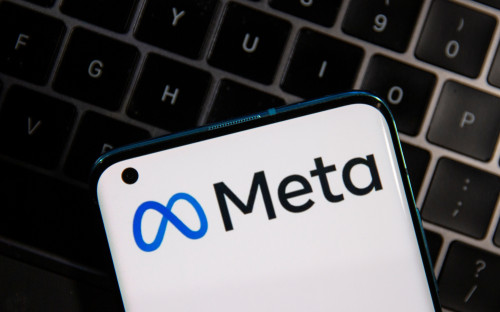By Jaspreet Singh and Kenrick Cai
(Reuters) -Meta Platforms rode strong advertising performance to beat analysts’ revenue estimates for the first quarter and match expectations for the next quarter on Wednesday, assuaging investor concerns over tariff-related economic growth fears.
The Facebook and Instagram parent also increased planned capital expenditures this year while slightly pulling back overall spending, as it speeds up construction of data centers that can support artificial intelligence, which it sees bolstering and transforming its business.
Shares of the company were up 4% in extended trading.
Meta boosted its 2025 capital expenditure plans to between $64 billion and $72 billion. CEO Mark Zuckerberg previously said the company could spend as much as $65 billion this year.
“The pace of progress across the industry and the opportunities ahead for us are staggering. I want to make sure that we’re working aggressively and efficiently, and I also want to make sure that we are building out the leading infrastructure and teams that we need to achieve our goals,” Zuckerberg told investors on a call after publishing results.
Meta executives said most of the capital expenditures would support the core business rather than generative AI development.
But CFO Susan Li said on the call that the increase to the forecast reflected additional data center investments to support the AI efforts, as well as potential increases in hardware expenses related to the impact of tariffs on export costs.
The increased outlays could help soothe concerns that AI interest might be waning, especially after analysts in March flagged early signs of tech majors pulling back on new data center commitments.
Still, the higher spending represents a red flag due to market concerns over economic turmoil, said Debra Aho Williamson, founder and chief analyst at Sonata Insights.
“If ad revenue continues to hold strong, then this increase in capital expenditures will be less of a bitter pill for investors to swallow,” Williamson said.
Meta reported revenue of $42.31 billion for the first quarter, compared with analysts’ average estimate of $41.40 billion, according to data compiled by LSEG.
Meta expects second-quarter revenue to be between $42.5 billion and $45.5 billion, compared with estimates of $44.01 billion.
The company reported profits of $6.43 per share, beating estimates of $5.28 per share, per the LSEG data.
Shares of AI chip makers rose after Meta and Microsoft reported financial results. Nvidia rose 2.7% and Advanced Micro Devices rose 1.8%.
Even as it raised capital expenditures, Meta lowered its total expenses forecast for the year to between $113 billion and $118 billion, from its earlier expectations of $114 billion to $119 billion.
USERS UP
Meta’s massive user base makes it a reliable go-to for advertisers at a time when U.S. tariff-induced uncertainty has prompted companies to tighten marketing budgets and delay campaigns.
Family daily active people (DAP), a metric it uses to track unique users who open any one of its apps in a day, rose 6% year-over-year to 3.43 billion.
Advertising accounts for the vast majority of Meta’s revenue. Some of the biggest U.S. advertisers include Chinese e-commerce websites Temu and Shein, who are sharply cutting their U.S. digital ad spending, industry data showed.
CFO Li said the company had seen some decreased spending from Asia-based e-commerce exporters but that generally trends in April had been healthy.
A day earlier, smaller rival Snap held back its second-quarter forecast and said that economic uncertainty and the administration’s ending of a duty-free import loophole were affecting its ad business, causing its shares to crater.
Li also noted a regulatory battle in Europe. She said there would be a significant impact to European revenue as soon as the third quarter due to an EU ruling that Meta breached the Digital Markets Act.
Meta’s proven advertising reliability means it stands to gain from economic instability, said Emarketer senior analyst Minda Smiley.
However, it “won’t be spared from a broader downturn if advertisers make substantial budget cuts and consumer spending falters,” she added.
Meta also is facing a high-stakes trial in Washington, in which the U.S. Federal Trade Commission is seeking to unwind the company’s acquisitions of prized assets Instagram and WhatsApp.
(Reporting by Jaspreet Singh in Bengaluru, Kenrick Cai in San Francisco, Echo Wang in New York; Editing by Sriraj Kalluvila, Alan Barona and Nia Williams)



